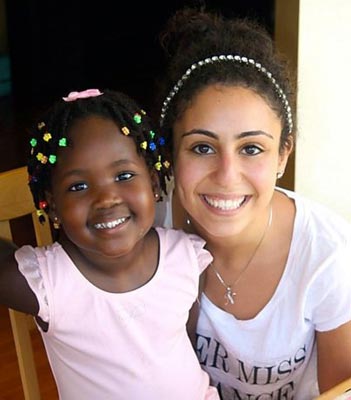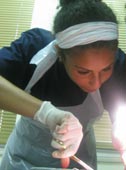Medical Students Are Learning Early about Surgery

Nada Gawad with her new adopted baby sister,
3 year old Durban South Africa native Maya
As a small child, Nada Gawad was at
the University of Toronto daycare centre
when her mother was completing
a PhD in Optical Engineering. Nada
took her first degree at the University
of Ottawa. She traveled to Africa as an
undergraduate, visiting Uganda, Kenya
and Madagascar. She shadowed a doctor
in the hospital in Madagascar and
observed in the operating room. She
was impressed by the idea that “you
could fix things! And I am a tactile
learner”. For her Honours project she
did a clinical study with cardiac surgeon
Frazer Rubens at the Ottawa
Heart Institute, helped in his office,
and shadowed him on clinical rounds.
On entering medical school at the University of Toronto, she shadowed clinicians
other than surgeons to broaden her education and solidify her conviction
that should become a surgeon. She participated in the “One Day Matters” in
general surgery doing paediatric surgery with Jack Langer once a week and
subsequently performed a summer research study with him on surgical wait
lists. With the International Federation of Medical Students, she went to
Romania for further clinical experience, including thoracic surgery.
She has recently worked with Chairman Jim Rutka, setting up the SEAD
(Surgical Exploration and Discovery) program (www.seadprogram.ca). 20 first
year students have signed up for the SEAD to observe in one of the surgical
specialties. Her needs assessment to see if this was attractive to pre-clerkship
students revealed that 85% were interested.

Nada Gawad
|
Nada collaborated with fellow student Konrad Salata
in a project to purchase pig skin suturing kits for 280
pre-clerkship students. They recruited 29 surgeons to
help teach first and second year students suturing
techniques. She got this idea from Skills Lab manager
Lisa Satterthwaite. For a DOCH2 (Determinants of
Community Health 2) project, she is working with
Teodor Grantcharov at St. Michael’s on a project to
introduce laparoscopic surgery to second year students.
|
Nada also worked
with residents in
Ottawa, giving feedback
on laparoscopic
techniques. Their procedures
are captured
on video. They give
themselves a score
as they review the
video, then a surgeon
advises them on how
they might improve.
They rescore their
video and report that
they have found this
very instructive (more
information can be found on http://www.seadprogram.ca/index.php). Nada hopes that this will become part
of the formal curriculum for the medical students; she
has been encouraged by pre-clerkship director Martin
Schrieber. She is also working with Darlene Fenech on
the curriculum for the Introduction to Surgery course.
She performed a needs assessment with 500 students and
a focus group with 10 students for her undergraduate
education report to George Christakis.
Outside of the medical world, Nada enjoys Hip Hop
Culture Shock Shop, and touch or flag football. She
plays with the Meds football team in the city league. She
has competed in hip hop contests and shows, including
one in Los Angeles.
Martin McKneally

Michael Bond
|
Michael Bond is a
third year medical
student, currently
enjoying his elective
surgical rotation on
orthopaedic surgery.
He has been interested
in anatomy since
highschool, when
an inspiring biology
teacher prompted
him to think about
structure and function.
His interest
was heightened by a
kinesiology course in
grade 12. As a Health Science major at McMaster, he
focused on anatomy with a view toward entering medical
school. He comes from a family of engineers and feels
this may have oriented him toward his career goal in
orthopaedic surgery. He loved learning in the clinic and
in the operating room on general surgery, neurosurgery
and orthopaedic surgery.
Michael has worked with Women’s College Hospital
rheumatologist and chief of Medicine Gillian Hawker
on research projects during two summers and intermittently
during the school year. He will do electives next
year to help decide where to pursue his goal of training in
academic orthopaedic surgery. He hopes to do a graduate
degree, probably in epidemiology. His role models have
been surgeons and physicians who are excellent in their
communications with patients, with the operating room
staff and in the clinics. He hopes to become an academic
surgeon with a focus is epidemiology and teaching. He
feels that the surgical teaching that he has received on
morning rounds, in the operating room, and in the
clinics has been unique and inspiring. He is particularly
complimentary about the near -peer teaching provided
by surgical residents. He has been active in singing as
an organizer and lead in the choir of the medical school
musical Daffydil.
M.M.
|